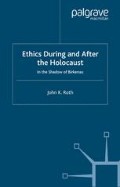Abstract
This book’s subtitle uses a phrase by Elie Wiesel, who suggests that Birkenau, the killing center at Auschwitz, which was the Holocaust’s most lethal site, calls everything into question. In particular, he says, the shadow of Birkenau requires reconsideration of traditions, theories, assumptions, and hopes. It should make us think more than twice about many things.
Not every being with a human face is human.
Carl Schmitt
Access this chapter
Tax calculation will be finalised at checkout
Purchases are for personal use only
Preview
Unable to display preview. Download preview PDF.
Notes
Primo Levi, The Drowned and the Saved, trans. Raymond Rosenthal (New York: Summit Books, 1988), p. 38.
Peter J. Haas, Morality after Auschwitz, The Radical Challenge of the Nazi Ethic (Philadelphia, PA: Fortress Press, 1988).
John K. Roth, ed., Ethics after the Holocaust (St. Paul, MN: Paragon House, 1999).
Claudia Koonz, The Nazi Conscience (Cambridge, MA: Harvard University Press, 2003), p. 1.
William T. Stooksbury, ed., Ethics for the Marine Lieutenant (Annapolis, MD: Center for the Study of Professional Military Ethics, US Naval Academy, 2002), p. ii.
Robert N. Proctor, Racial Hygiene: Medicine under the Nazis (Cambridge, MA: Harvard University Press, 1988), pp. 83–5.
Dieter Kuntz, ed., Deadly Medicine: Creating the Master Race (Washington, DC and Chapel Hill, NC: United States Holocaust Memorial Museum and University of North Carolina Press, 2004).
Hermann Böhm, Darf ich meine Base heiraten? (Berlin: Reichsausschuss für Volksgesundheitsdienst, 1935), p. 67.
Sarah Kofman, Smothered Words, trans. Madeleine Dobie (Evanston, IL: Northwestern University Press, 1998), p. 39.
Jean-Luc Nancy, “Foreword: Run, Sarah!” in Penelope Deutscher and Kelly Oliver, eds., Enigmas: Essays on Sarah Kofman (Ithaca, NY: Cornell University Press, 1999), p. ix.
Charlotte Delbo, Auschwitz and After, trans. Rosette C. Lamont (New Haven, CT: Yale University Press, 1995).
Kofman, Smothered Words and Sarah Kofman, Rue Ordener, Rue Labat, trans. Ann Smock (Lincoln: University of Nebraska Press, 1996).
David Weinberg, “France,” in Walter Laqueur, ed., The Holocaust Encyclopedia (New Haven, CT: Yale University Press, 2001), pp. 213–22.
Richard Rorty, “Human Rights, Rationality, and Sentimentality,” in Patrick Hayden, ed., The Philosophy of Human Rights (St. Paul, MN: Paragon House, 2001), p. 251.
Kofman ends Smothered Words with this quotation from Blanchot (see p. 73). The quoted passage comes from The Infinite Conversation, trans. Susan Hanson (Minneapolis: University of Minnesota Press, 1993), p. 135.
Theodor Adorno, Negative Dialectics, trans. E. B. Ashton (New York: Seabury Press, 1973), p. 367.
Copyright information
© 2005 John K. Roth
About this chapter
Cite this chapter
Roth, J.K. (2005). Gray Zones and Double-Binds: Holocaust Challenges to Ethics. In: Ethics During and After the Holocaust. Palgrave Macmillan, London. https://doi.org/10.1057/9780230513105_5
Download citation
DOI: https://doi.org/10.1057/9780230513105_5
Publisher Name: Palgrave Macmillan, London
Print ISBN: 978-1-4039-3378-2
Online ISBN: 978-0-230-51310-5
eBook Packages: Palgrave Religion & Philosophy CollectionPhilosophy and Religion (R0)

